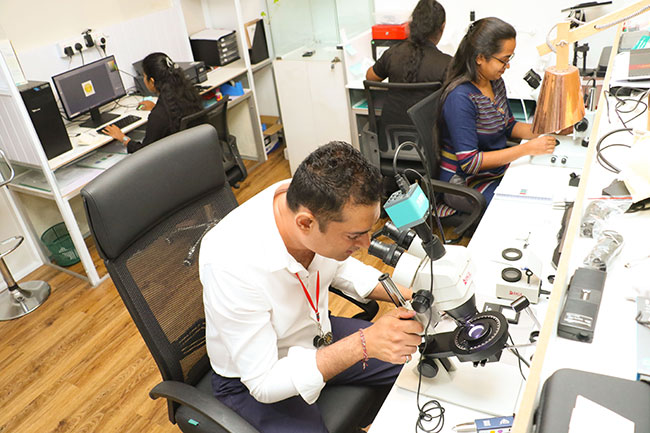Business
Implementation seen as key to Budget 2025’s success

By Ifham Nizam
Despite the 2025 budget’s optimistic outlook, implementation remains the key to its success, warned Nandika Buddhipala, Chief Financial Officer of Commercial Bank PLC.
Speaking at a post budget seminar on Wednesday organized by the National Chamber of Commerce of Sri Lanka, Buddhipala stressed that while tax reforms and fiscal discipline are necessary, businesses will need clarity on regulatory frameworks—especially concerning VAT changes, investment incentives and trade policies.
In response to a question posed by The Island Financial Review, he added: “Budget 2025 sets the foundation for growth, but execution will be the true test. If we can manage debt effectively, encourage exports and attract investors, we can create a resilient economy.”
Buddhipala added: “We appreciate the government’s efforts in aligning the budget with the Public Finance Management Act and the IMF Debt Sustainability Framework. However, it is critical that we remain aware of the persistent debt servicing and interest cost burden.
“Sri Lanka’s high borrowing costs mean that interest payments remain a significant portion of government expenditure. Policymakers should adopt concrete plans for reducing this burden while ensuring economic stability.
“We must create an environment that fosters exports and attracts FDI. The emphasis should be on trade-oriented sectors rather than industries that do not contribute to foreign exchange earnings.
“The government’s aims to strengthen ties with ASEAN nations through participation in the Regional Comprehensive Economic Partnership (RCEP), is a move that could boost trade and investment opportunities.
“We need to expand Double Taxation Agreements (DTAs) beyond the current 46 countries. This would increase investor confidence and facilitate smoother trade flows.
“The proposed Development Bank, which seeks to provide financial support for SMEs and new entrepreneurs, is a positive step but access to finance must be streamlined.
“Providing tailored financial solutions for SMEs is essential. However, ensuring that the Development Bank is efficiently integrated into the existing banking system will determine its success.
“This budget is a strategic response to economic challenges. We need to strike a balance between private sector-driven growth and state intervention to ensure stability and equitable distribution of wealth.”
Meanwhile an official explained in response to another query raised by this newspaper: “The first reading of the budget, which will be followed by a month-long discussion in a budget-related forum, aims to clarify ambiguities and refine implementation strategies. There are a lot of concerns regarding implementation, but this one-month period allows us to fine-tune certain aspects.”
A senior Finance Ministry representative added the following: “We have to consider international expectations and commitments, especially in the context of the International Monetary Fund (IMF) agreements. The recent IMF release of USD 330 million following policy adjustments shows the importance of staying within global economic expectations.
Hasitha Radella of KPMG Sri Lanka, presenting an overview of tax reforms said that as Sri Lanka continues its recovery, the budget is focused on several taxation reforms. Sustained improvements in fiscal management will be key to maintaining growth momentum for the country.
“Clarifications on the Simplified Value Added Tax (SVAT) system and the transition from SVAT to a Risk-Based Refund System that will streamline the VAT refund process to an efficient process are urgent requirements, said Ms. Iyesha Asanthi, Commissioner, Tax Policy & legislation of the Inland Revenue Department.
She said that if any eligible exporter who exports more than 50 percent of total supplies requires VAT refunds under the new risk-based refund system, such a need could be included in a relevant pilot project.
She added that the current VAT threshold is Rs. 15 million per quarter and Rs. 60 million per year at the standard rate 18%. Due to the current situation in the country, the budget proposals of 2025 do not include tax exemptions or concessions. However, the budget proposals made to amend individuals’ tax rates by increasing tax relief from Rs 1.2 million to 1.8 million and the relaxing of tax brackets could benefit individuals, including employees.
Ms. Jayani Wickrama Arachchi, Director, Fiscal Policy Department of Ministry of Finance, Planning and Economic Development said that with the fiscal space being highly constrained, every policy move must be strategic, ensuring key fiscal targets are protected while safeguarding economic stability in the medium term. Interest payments remain a significant burden, accounting for substantial government recurrent expenditure, primarily due to Sri Lanka’s high borrowing costs.
She added: “We need to move ahead despite these challenges.”
Business
‘With AI around, hardly anyone does any real work,’ says university don

While the corporate world celebrates the merger of efficiency and ecology, a leading academic last week issued a sobering warning: the very technology driving the next “Green Revolution” may leave the human workforce behind.
Speaking at the recently concluded Green Productivity Awards, organised by the Sri Lanka Association for the Advancement of Quality and Productivity (SLAAQP), Professor Hiran Amarasekera of the University of Sri Jayewardenepura characterised Artificial Intelligence (AI) as a “godsend” for environmental sustainability – but one that carries profound social risks.
Professor Amarasekera’s keynote address cut through the celebratory atmosphere, targeting a perceived complacency among top-tier management.
“Managers are already using AI, but many CEOs, directors and managing directors remain sceptical,” he observed. “They think AI will come in another five years. No, it is already here.”
According to the Professor, AI is no longer a futuristic concept but a functional tool currently revolutionising green metrics. He highlighted how the technology is already replacing manual monitoring for energy optimisation, using predictive algorithms to drastically reduce industrial waste, and automating sustainability reporting – turning months of consumption data analysis into a task of mere seconds.
While these advancements provide a massive boost to the “bottom line” and help organisations meet the national Net Zero pledge, Prof. Amarasekera warned of a looming “danger”: the displacement of human workers.
“AI is boosting productivity while cutting back the need for human resources. What will happen to the jobs and the wider society? Not even the USA or other advanced economies have an answer to this,” he noted.
In a moment that elicited both laughter and reflection from the audience, he touched upon the irony of modern higher education: “Students produce their work through AI and we detect plagiarism through AI. So, with AI around, hardly anyone does any real work!”
The technological warning was balanced by the moral urgency of Senior Professor Ajith de Alwis from the University of Moratuwa. Invoking the words of David Attenborough, Prof. de Alwis asked the audience how they would look into the eyes of their grandchildren if they knew of the world’s collapse and did nothing.
The takeaway message of the evening was clear: While AI provides the tools to save the planet, human leadership remains the only force capable of managing the social consequences of that salvation.
Despite the warnings of future challenges, the SLAAQP awards proved that Sri Lankan industries are currently making notable strides. The event recognised 38 organisations – including 28 Gold Award winners – across sectors ranging from plantation, garments and rubber to poultry and textiles.
These winners were evaluated on four critical pillars: Leadership, Environmental Sustainability, Productivity Enhancement and Social Contribution.
By Sanath Nanayakkare
Business
Gemological Report of Ceylon sets new global benchmark for local gemstone certification

Steps into a critical void to earn recognition in international markets
For decades, Sri Lanka has been globally revered as the “Island of Gems,” yet the industry has long grappled with a paradoxical challenge: while the Sri Lankan soil yields the world’s finest stones, the local certification process has often struggled to command the same recognition in international markets.
Stepping into this critical void is the Gemological Report of Ceylon (GRC). Located at No. 97, Galle Road, Colombo 3, this newly launched laboratory is on a mission to redefine the standards of local gem certification, ensuring that the “fatherhood” of Sri Lankan gemstones remains firmly within its home soil.
Founded by Milinda Edirisinghe, a seasoned gemologist with over 20 years of experience in mining, trading, and geological study, GRC is the result of a lifelong observation of the industry’s “trust gap.”
“I saw a critical disparity,” says Edirisinghe, who received specialised training in Thailand, the global hub for gemstone treatments. “Sri Lankan exporters often face unfair skepticism in markets like Thailand, Hong Kong, and the US. International buyers often view local reports with doubt. I launched GRC to provide a local institute that is on par with the highest-caliber laboratories in the world.”
He made these comments while speaking to media at the new laboratory.
According to him, in its first month of operation, GRC has already seen a surge in demand, processing 30 to 40 stones daily – a success driven largely by its word-of-mouth reputation.

Milinda Edirisinghe performs a sensory inspection of a gemstone using a loupe to assess its initial characteristics
“The lab’s rapid growth is built on a foundation of total transparency. Unlike traditional setups, GRC employs a rigorous triple-blind screening process: three independent gemologists evaluate each specimen – from Sapphires, Ruby and Emeralds to semi-precious stones, polycrystals, rare meteorites, and even organic materials like natural Pearls, and rare coral species etc., used in high-end jewelry. By evaluating the stones without consulting one another, the three gemologists’ independent findings are then synthesised into a final, authoritative and error-free assessment,” he explained.
“As gemstone treatments become increasingly sophisticated – ranging from Beryllium diffusion to evolving heat and irradiation treatments – the need for advanced technology is paramount. GRC’s facility is equipped to identify the full spectrum of enhancements, ensuring the end consumer knows the exact “human intervention” history of their asset,” he further said.
However, Edirisinghe maintains that technology is a tool, not a replacement. When asked if AI could eventually handle the certification job alone, he noted:
“AI already assists our workflow to an extent, but a human gemologist remains an indispensable part of the process. Just as a surgeon uses advanced technology to enhance precision, they must still be present to execute the nuances of a complex operation. AI cannot truly ‘see,’ touch, or feel the soul of a stone.”
He further added, “AI can support our findings, but it cannot replace the gemologist’s ‘eye-view’ and the tactile senses that go a long way in issuing an accurate certification.”
Furthermore, GRC leverages an international expert network. “If we encounter a complex inclusion, we utilize virtual screen-sharing with leading labs in Thailand for real-time peer review,” Edirisinghe explains. “Our conclusions are science-based facts, not just opinions.”
Beyond technical excellence, GRC serves a vital economic purpose. Historically, local dealers spent thousands of dollars obtaining international certificates. GRC offers these world-class reports at a fraction of the cost, with detailed certificates starting from LKR 15,000 for full reports, a medium report at LKR 6,000, “memo cards” at LKR 1,500, and verbal opinions for LKR 500.
“By providing a credible, globally-recognised home-based laboratory, we are stemming the outflow of foreign currency to international labs,” said Edirisinghe.
With plans to participate in upcoming exhibitions in Dubai, Hong Kong, and the USA, GRC is positioning itself as a global contender. As the industry shifts toward “knowledgeable customers” who view jewellery as a liquid asset, GRC stands ready to provide the clarity and integrity the Sri Lankan gem industry deserves.
“If Sri Lanka produces the best stones in the world, it is only right that we also provide the world-class expertise to certify them. Our mission is to ensure that the ‘fatherhood’ of these precious stones remains in Sri Lanka, backed by a certificate that is respected from the USA to the European Union,” Edirisinghe said in conclusion.
By Sanath Nanayakkare
Business
Ministry of Brands to launch Sri Lanka’s first off-price retail destination

Sri Lanka’s retail landscape will reach a major milestone with the launch of Ministry of Brands (MOB), the country’s first off-price retailer. The flagship store is set to open on 16 February 2026, introducing Sri Lankan consumers to authentic global luxury and premium brands at discounts of up to 90% off original retail prices.
Backed by Akbar Brothers, Ministry of Brands brings the globally established off-price model to South Asia for the first time. The concept allows customers to shop for genuine designer and brand-name products at significantly reduced prices while supporting more sustainable retail practices.
The 10,000 sq. ft. flagship store, located at 28/9, Vajira Road, R.A. De Mel Mawatha, Colombo 4, will feature an extensive range across apparel, footwear, handbags, accessories, homeware, and more. Ministry of Brands will carry over 2,000 international and designer brands spanning womenswear, menswear, childrenswear, home, and accessories, including names such as Gucci, Ferragamo, Valentino, Michael Kors, Ralph Lauren, Burberry, Rag & Bone, Lacoste, Puma, UGG, HOKA, Brooks, Air Jordan, and many more.
Off-price retail is one of the fastest-growing global retail segments, helping fashion houses responsibly manage excess inventory. With the UN Environment Programme estimating 92 million tonnes of textile waste generated annually, sustainable retail models such as off-price are increasingly important.
“Sri Lanka manufactures for many of the world’s leading designer labels, yet these products have often remained out of reach for local consumers,” said Director of Ministry of Brands, Aamir Akbarally. “Through off-price retail, we are proud to make genuine designer brands more accessible to our fellow Sri Lankans, offering premium fashion at affordable prices while delivering a world-class shopping experience built on Akbar Brothers’ longstanding values of integrity, quality, and trust.”
Ministry of Brands Director, Ramzey Hammoud added: “With decades of experience in off-price retail, we see this as an exciting new growth chapter for Sri Lanka’s retail landscape. Our goal is simple: to allow customers to shop global designer brands locally at the best prices, while rediscovering the thrill of the find through a constantly changing, treasure-hunt shopping experience.”
Following the Colombo flagship launch, Ministry of Brands will open a second location at the One Galle Face Mall, with plans to expand across South Asia and Australia.
-

 Life style1 day ago
Life style1 day agoMarriot new GM Suranga
-

 Midweek Review5 days ago
Midweek Review5 days agoA question of national pride
-

 Business5 days ago
Business5 days agoAutodoc 360 relocates to reinforce commitment to premium auto care
-

 Features1 day ago
Features1 day agoMonks’ march, in America and Sri Lanka
-

 Opinion4 days ago
Opinion4 days agoWill computers ever be intelligent?
-

 Features1 day ago
Features1 day agoThe Rise of Takaichi
-

 Features1 day ago
Features1 day agoWetlands of Sri Lanka:
-

 Midweek Review5 days ago
Midweek Review5 days agoTheatre and Anthropocentrism in the age of Climate Emergency













